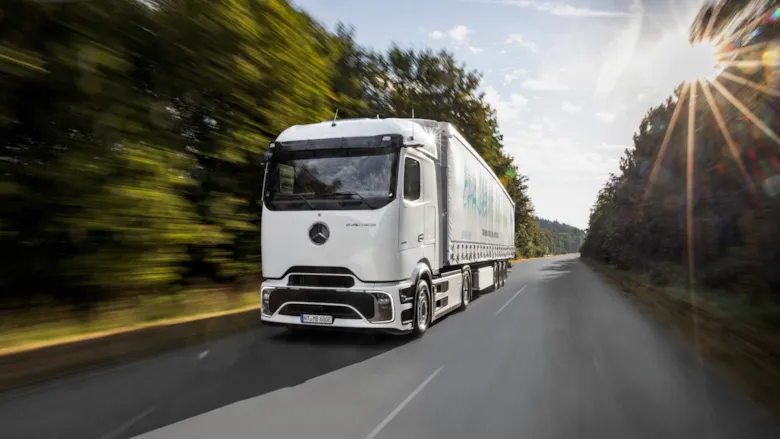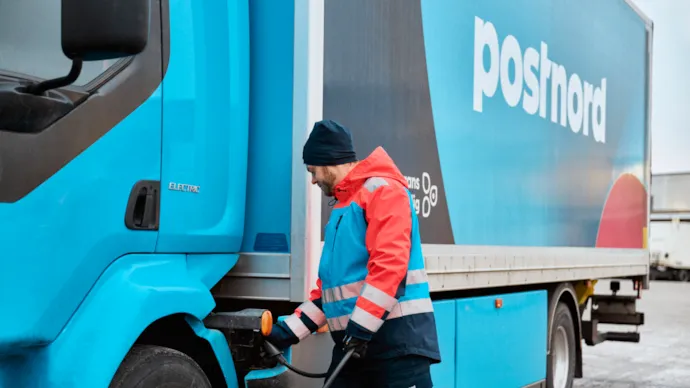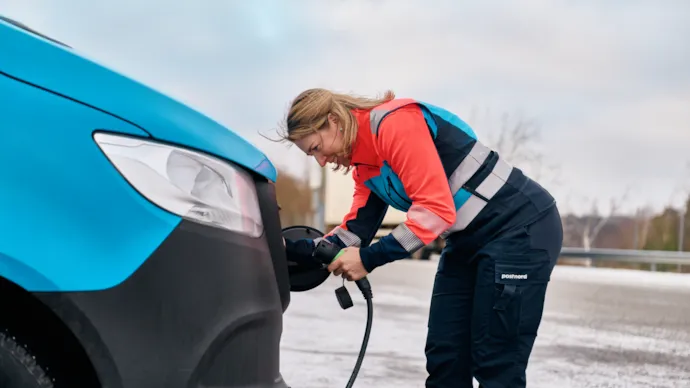PostNord Finland tests the boundaries of electric trucks
Across the Nordics, electric vans are being have already been successfully deployed as part of PostNord’s efforts to reduce environmental climate impact. In Finland, a significant step towards achieving the climate goals is being taken with an ambitious pilot project aimed at testing and introducing electric heavy-duty trucks.
Set to begin operations in March 2025, the new electric truck will travel over 700 kilometers daily between the Vantaa and Turku terminals, marking a new milestone in PostNord’s commitment to reducing emissions and paving a more sustainable future for the logistics industry.
"We are heavily focused on the electric vans, that is our key priority," says Ilmo Strömberg, Climate Lead at PostNord Finland. "But we also want to understand what is possible on the heavy-duty electric truck side. It's aligned with our goal to be fossil-free by 2030."
A first for PostNord
The Mercedes-Benz eActros 600, a new generation of heavy-duty electric trucks, will be the first electric truck of its kind in PostNord's fleet. The truck will operate twice daily between the Vantaa and Turku terminals, with Vantaa serving as its home base due to the presence of the recently installed fast charger.
With over 700 kilometers covered daily, the truck will set a record for distance covered by a heavy-duty electric vehicle in Finland, saving an estimated 500 kilograms of CO2 carbon emissions daily.
The pilot project will provide vital insights into the operational capacity of electric trucks, helping PostNord assess whether they are a viable alternative to diesel-powered transportation. "We need to understand what's possible,” in the electric truck segment," explains Strömberg. "Is it really possible to drive 700 kilometers a day? And if it is, it also opens up the possibility of driving not just between Vantaa and Turku, but also to cities in the far north."
Testing the limits
The pilot project is being conducted in collaboration with the Finnish government, which is co-funding the initiative as part of its commitment to advancing sustainable transportation. Data gathered during the pilot will be reported to the Finnish Transportation Agency, with findings made publicly available to encourage the adoption of electric trucks across Finland and beyond.
"Hopefully, it will speed up not only the transformation for us but for other countries," says Strömberg. "They'll see it makes sense to invest in heavy-duty electric trucks if the range is favorable and they work in winter conditions, and if the payback time is reasonable. They'll see it makes sense to invest in heavy-duty electric trucks if the payback time and range is good, and it works in winter. We hope to get these kinds of learnings from the pilot."
Strömberg acknowledges that certain challenges lie ahead. One of the central objectives of the pilot is to understand the impact of cold weather on the truck's range and performance. The range of the eActros 600 is projected to be around 500 kilometers, but Strömberg notes this might be affected by the freezing temperatures experienced in Finland in the winter.


Based on experience with electric vans, he anticipates that the truck's range could drop significantly, particularly in northern Finland, where temperatures are colder than in the south.
The pilot will help develop strategies to ensure reliable operations during the winter months, potentially including public fast chargers in Turku if the truck's range drops too low.
"In the summertime, we only need to charge the electric truck in our Vantaa terminal with the fast charger, but if it gets really cold, we might also need to charge it at the Turku site," says Strömberg. These insights will be crucial for scaling the use of electric trucks both in Finland and the broader Nordic region.
A roadmap for fossil-free logistics
If the pilot proves successful, it will accelerate the shift away from diesel trucks, furthering collective efforts towards achieving carbon-neutral fossil- and emission-free logistics. The data gathered during the project will provide valuable insights into the capabilities of electric trucks, their performance in cold conditions, and the overall payback time for the investment.
"This is our first experience using an electric truck," says Strömberg. "If everything goes smoothly, it will speed up the transition from diesel to green electricity."
Read more

Electrification of transportation & logistics
PostNord is moving toward our 2030 fossil-free target, with electrification playing a key role. However, a range of complexities means progress may not advance as quickly as one might hope.

Electrifying heavy transport: PostNord’s journey to fossil freedom
Heavy transport plays a central role in PostNord’s logistics and delivery operations. It makes it possible to move large quantities of goods over long distances, meeting the demands of both business and individual customers.

We manifest climate leadership
Climate change is one of the greatest challenges of our time. The transportation sector accounts for a major share of global greenhouse gas emissions. As a leading player in logistics in the Nordics, it’s up to us to take the lead in the industry’s climate transition.
